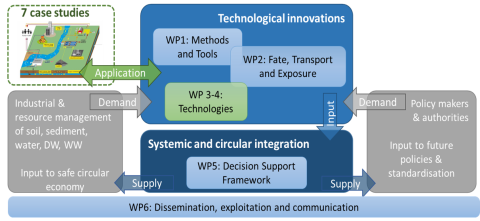Work Packages
In several Work Packages, analytical and toxicological methods as well as monitoring strategies will be developed to enhance understanding of the origins, fate, and transport pathways of industrial Persistent, Mobile and potentially Toxic chemicals (iPM(T)s).
Lead: BRGM
WP1 will develop and validate chemical and toxicological methods and strategies for the implementation in PROMISCES activities.
This includes numerous chemical developments for targeted PFAS, including precursors and transformation products (quantitative methods for waste, surface- and groundwater, soils, landfill leachates, sewage sludge (SS), concentrates solutions, stack emissions and fertilisers). Methods based on Non-Target Screening (NTS) approaches will be implemented for identification of new iPMT compounds in waters and of PFAS’s transformation products during remediation processes. Different characterizations of global organic fluorine content through methods for soil, SS and fertilisers will be compared.
Concerning toxicological approaches, PROMISCES partners will improve methodologies for toxicological assessment of environmental media by combining in silico (through QSAR models) and in vitro (through improvement of the existing bioassay panel). A particular interest will be on specific endpoints for PFAS/PMT...). Objective is to provide a set of toxicological assessment and regulatory tools.
Propositions of monitoring strategies including chemical and toxicological assessments will be proposed for implementation in different regulations.
Lead: DELTARES & RIVM
WP2 will develop and improve knowledge on innovative modelling approaches for fate, transport and exposure to PM chemicals by i) operationalising novel in silico approaches for PM property identification; ii) exploiting experimental data for various PMs in different environmental compartments using advanced analytical procedures and workflow developed in WP1; iii) developing flow and reactive transport models and model trains which can assess PM exposure on different time scales from short- to long-term trends, and different spatial scales e.g. from source to catchment scale, in soil, sediment and surface and groundwater, as well as related human health: and iv) improve risk assessment for PM(T)s by combining newly developed tools and data to assess risks in environmental compartments and for human
exposure via several routes relevant for resource recovery and reuse in the CE.
Lead: IPGP
WP3 will develop and demonstrate innovative technologies to: i) remove PFAS/iPM(T) substances from the contaminated soil-groundwater continuum; ii) provide novel treatment options for dredged sediments and sewage sludge to prevent PFAS transfer into material-based Circular Economy routes; iii) reduce PFAS emissions from fertilisers sourced from sewage sludge to the soil-water-plant continuum; iv) provide data on treatment performance for risk assessments (WP2); v) feed the technical management options into the decision support framework (WP5)
Lead: KWB
WP4 develops and tests innovative technologies to remove chemicals from the water cycle. The work involves developing innovative drinking water treatment trains to remove iPM(T)s and PFAS from water sources with high organic matter background, reducing the transfer of iPM(T)s and PFAS during water reuse of industrially-influenced municipal wastewater for agricultural irrigation, and minimising municipal wastewater treatment plants’ PFAS and industrial chemical emissions. Additionally, novel landfill leachate treatment options to eliminate PFAS emissions will be established. Performance data for technical risk management options will be used in the human health risk assessment and the decision support framework.
Lead: INERIS & RIVM
WP5 develops a novel decision support framework (DSF) to support decisions on preventing, mitigating and remediating PM(T) substances in the environment. The DSF will serve product designers, risk managers and policy-makers in building zero pollution strategies for safe reuse of resources in the circular economy. The DSF will be fed by all PROMISCES activities and existing databases. It will integrate three key modules: (1) Diagnosis, to identify the most critical endpoints and PM(T) groups hindering transition towards a circular economy; (2) Solutions, to search for solutions and assess their performance, taking into account a wide range of parameters, such as PM(T) characteristics, costs and social benefit; and (3) Strategies, to learn how to co-create with relevant stakeholders a risk management strategy for PM(T)-use combinations, with a portfolio of solutions that together can solve both short-term (mitigation and remediation) and long-term (prevention and substitution) PM(T) pollution concerns in a CE context”. WP5 also distills the discoveries in PROMISCES into policy recommendations.
Lead: DECHEMA e.V.
WP6 deals with the planning of communication, dissemination, and exploitation activities to reach the greatest possible impact of PROMISCES activities and results. This includes managing the online presence of PROMISCES, organizing workshops and events, and coordinating stakeholder engagement. Another focus lies on communicating the risks related to PFAS and iPM(T)s in the urban water cycle to the public by establishing an online communication item. Finally, PROMISCES Zero Pollution solutions are elaborated in a CEN Workshop Agreement (CWA).
Lead: BRGM
WP7 ensures the overall coordination and management of the project and the interactions between the project partners, the Consortium, the European Commission and external institutions. This ensures the operational management of the project including strategic, financial and administrative aspects. A Data Management Plan supports the data management life cycle, specifying how data will be collected, processed, monitored, catalogued, and disseminated during the lifetime of PROMISCES. Risks are constantly assessed and evaluated throughout the whole project duration with a specific attention to risks for case studies.

